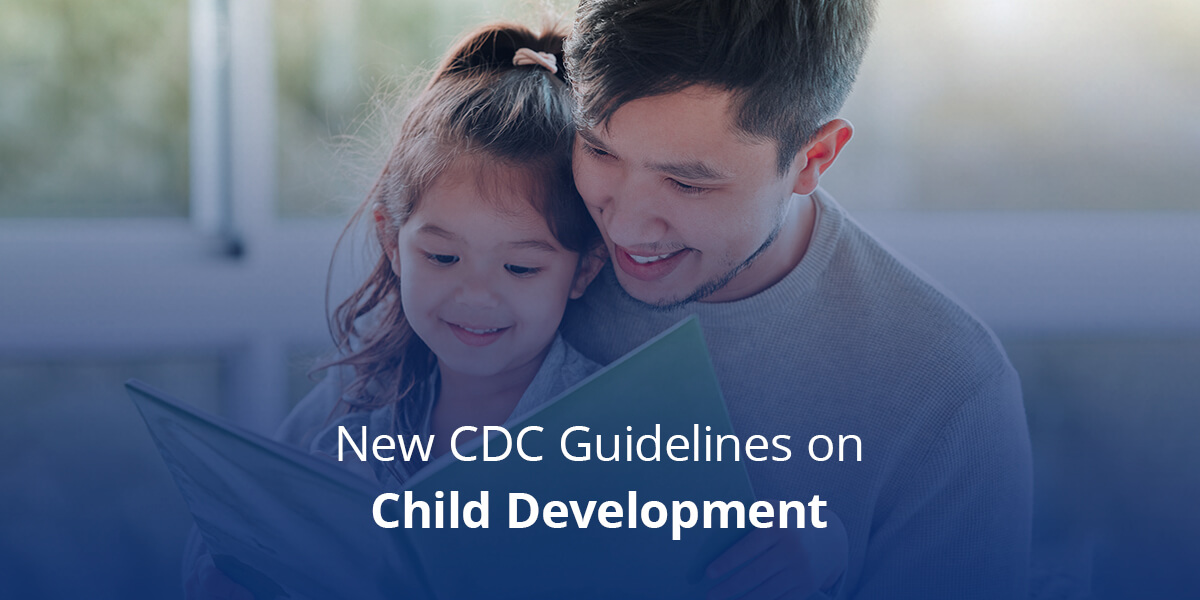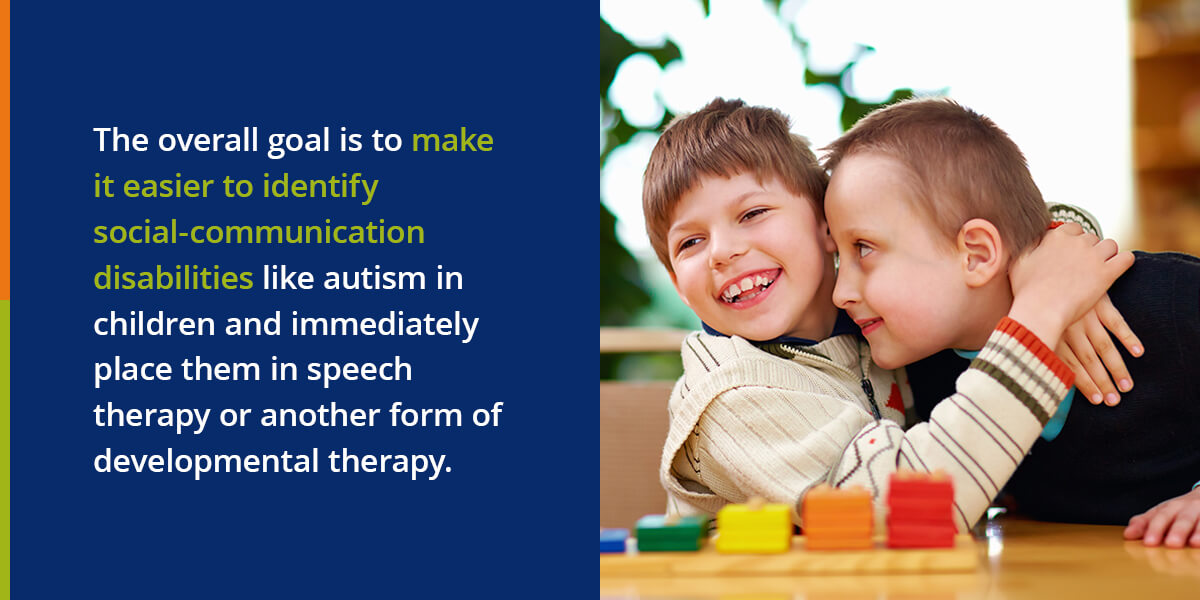
As a speech-language pathologist (SLP), physical therapist (PT) or occupational therapist (OT), you’re likely familiar with the Centers for Disease Control and Prevention (CDC) guidelines on child development. These guidelines serve as an aid to help you evaluate a child’s development in several areas, such as their social, emotional, language, cognitive and physical abilities.
While it takes more than a checklist of milestones to determine how well a child is developing, these guidelines can be a useful tool for early intervention. In this guide, we’ll discuss the new CDC milestones vs. the old milestones, how professionals have responded to these changes and how you can continue your education in this field to grow your knowledge and skills and provide a better standard of care.
What Are CDC Developmental Guidelines?
The CDC’s Act Early guidelines for child development help therapists and other health professionals monitor how a child is progressing, growing and developing the habits and behaviors that will impact their long-term health. These milestone checklists act as communication tools between therapists and families to determine if additional screening and evaluation are needed for a developmental concern.
The developmental milestones describe certain behaviors, movements, learning abilities and language skills that a child possesses at certain ages, starting from two months to five years old. The milestone checklists on the CDC’s guidelines include:
- Open-ended questions for therapists to use to address concerns.
- Reminders to conduct developmental screening.
- Information about child early intervention.
- Tips for parents and caregivers to help promote development in their children.
While the developmental milestones are not the same as the CDC’s overall guidelines and should not be used as screening or diagnostic tools, they can be helpful for therapists to note developmental concerns and determine if further tools, referrals or services are needed.
The CDC formed these guidelines based on evidence-based research for different child development stages, and they represent a norm for 75% or more of children during those life stages. However, these milestones do not list every milestone children should or will exhibit.
OTs, PTs, SLPs and other therapy professionals can use these markers and create more actionable interventions, such as prompt screening and referrals if even one milestone is missing. These CDC milestone changes were largely intended to speed up access to treatment and reduce the “wait and see” method that many professionals often use when a child is missing one or more milestones for their average age.
What Has Changed?
In February 2022, the CDC revised and added to the milestones of the “Learn the Signs. Act Early” guidelines. Here are the three major updates that occurred:
1. Lower Standards for Language
The previous language milestones stated that children should be able to communicate at least 50 words by the time they are two years old because it’s expected in at least 50% of children. The new guidelines push this milestone to 30 months, when 75% of children should have a vocabulary of about 50 words. Consequently, this lowers the speech and language standard for children to start combining words at a younger age.
2. New 15-Month and 30-Month Milestones
The most significant change to the CDC developmental milestones was the addition of guidelines for 15-month and 30-month-old toddlers, which were not previously listed. The 15-month milestone checklist includes behaviors like:
- Mimicking other children while playing.
- Clapping when excited.
- Showing affection, such as hugs and kisses.
- Recognizing familiar objects.
- Pointing at something to ask for help.
- Taking a few steps on their own.
The 30-month milestone checklist includes behaviors like:
- Playing with other children.
- Following simple routines, like clean up time.
- Saying two or more words together.
- Playing pretend with dolls or toys.
- Exhibiting simple problem-solving skills.
- Knowing at least one color.
- Using their hands to turn doorknobs, flip through a book or undress.
3. Additional Removals and Changes to Existing Milestones
The CDC also made other changes to milestones to show signs of certain developmental disorders like autism spectrum disorder (ASD). It bumped up new developmental milestones to older ages, such as the average age for displaying fine motor skills. It also added some milestones, like calming down when spoken to or picked up at 2 months old or smiling to get attention at 4 months old.
Many milestones were removed, however, due to potential confusion over the redundancy in some of the milestones. One of these removed milestones includes crawling, which requires multiple reflexes like neck, feet and leg control.

Why Did the CDC Change the Milestones?
The CDC updated these guidelines — for the first time since 2004 — to more effectively support professionals and families as they communicate about a child’s development. With these changes, the CDC hopes to help professionals and parents identify, track and take action on developmental concerns at more specific ages so children may get the treatment they need.
The overall goal is to make it easier to identify social-communication disabilities like autism in children and immediately place them in speech therapy or another form of developmental therapy. Some parents and professionals speculate that pushing certain milestones to older ages is a result of the COVID-19 pandemic, where many young children were born into social isolation that may have led to an increase in things like speech delays or communication skills.
How These Changes Impact Therapists
The new CDC milestones may affect how therapists determine developmental delays in children. The response to these changes by many professionals in the community reflects the controversy about how to interpret and use these new guidelines. These CDC milestones for therapists and parents may seem conflicting and confusing — removing crawling as a milestone, for example, can eliminate the evaluation of certain physical and cognitive skills.
Early identification of such delays or concerns is critical for helping children receive the treatment they need to reach their full potential. The previous guidelines were based on the 50th percentile, whereas the new guidelines are based on the 75th percentile.
While the goal of this change was to make it easier for therapists and parents to conduct treatment sooner, some professionals worry that these lowered standards may encourage the “wait and see” approach, which involves waiting longer to refer a child to a specialist until their delay becomes more severe. As a result, therapists may see more cases of new child patients arriving with more severe symptoms that may be more difficult to treat and extend time in therapy.
Lowering standards for speech and langauge, for instance, could prevent children from receiving a late individualized family service plan (IFSP) or individualized education plan (IEP), delaying their access to much-needed services and assessments. Additionally, the CDC did not have any SLPs involved in revising the speech and language developmental milestones, which has caused some concern for therapists and what they should advise parents.

Learn More About Development With Courses From ERI
It’s important to stay informed about the new CDC guidelines for child development. Parents and caregivers who bring their child to your care will likely have questions about these new updates and what that means for their child’s growth and development. Some parents may feel their child is not reaching their full potential, especially with these new changes.
As an OT, PT or SLP, it’s always best for you to continue learning and educating yourself in the field to improve outcomes for your patients and help parents understand their child’s unique needs and timelines. At ERI, it’s our goal to provide therapists like you with access to professional development and educational courses to help you maintain your license, provide better care and remind yourself why you love what you do.
We offer Continuing Education Unit (CEU) webinars, online courses and in-person courses to fit your educational needs. Browse our courses online or contact us today to learn more.

 What does on-demand include?
What does on-demand include? ERI is excited to announce the first of a 4-part series on Neonatal Therapy.
ERI is excited to announce the first of a 4-part series on Neonatal Therapy.  In Part 1 of this beginner to intermediate course, you will learn foundational knowledge pertaining to the philosophical and structural framework supporting neonatal therapy, the impact of the environment on the developing neonate and family, and the body system dynamics that influence the neonate’s development and the neonatal therapist’s supportive interventions.
In Part 1 of this beginner to intermediate course, you will learn foundational knowledge pertaining to the philosophical and structural framework supporting neonatal therapy, the impact of the environment on the developing neonate and family, and the body system dynamics that influence the neonate’s development and the neonatal therapist’s supportive interventions.
 ERI is honored to have
ERI is honored to have  It’s no secret that treating the complex cardiovascular and pulmonary patient can be challenging. By utilizing in-depth case analysis of complex patients, this course will help to further bridge the gap between content knowledge and clinical application.
It’s no secret that treating the complex cardiovascular and pulmonary patient can be challenging. By utilizing in-depth case analysis of complex patients, this course will help to further bridge the gap between content knowledge and clinical application.